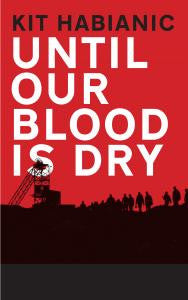Up ahead, Helen saw the police line harden into a barricade of bodies and shields. Resin batons thudded on Perspex shields; slow, thuggish, brutal. Goosebumps studded her arms and legs. Her pace slowed to the truncheons’ beat. Mary halted a yard from the riot shields, raised her megaphone.
‘We are women from Ystrad an’ from all over Wales,’ she said. ‘We are here to make peaceful protest. Here in solidarity with the men.’
The drumming quickened.
Trouble is brewing in Ystrad. It is time to defend jobs, the pits and a way of life that has formed both the life of valley and the nation.
The union is squaring up to the Coal Board, the government, the country. Gwyn Pritchard, overman at Blackthorn colliery, believes that the way to save his pit is to keep the mine open and production high. His men disagree and when an old collier dies on Gwyn’s shift, the men’s simmering resentment spills over into open defiance.
But Gwyn faces a challenge at home too. His daughter Helen is in love with a fiery young collier, Scrapper Jones. In March 1984, when miners across the country begin the long strike, Scrapper throws himself into the struggle and Helen joins the women, preparing food for the soup kitchen and standing with the men on the picket line.
Helen and Gwyn must decide which side they are on as the year-long dispute drives the Pritchard family apart and the Jones family to ruin.
What matters most: to be right, to be loved or to belong?
Until our Blood is Dry is a novel of passion and love, betrayal and decisions in a time and a place when a people were forced to fight for their future.
[A] roaring success: a gripping and ultimately moving novel that fills a gap in our national story... A brave subject for a debut novel [and] Habianic pulls it off... It is a story that does not forget women, and as such - and to its own betterment - becomes much more about human drama than union politics. – Wales Arts Review
Kit Habianic grew up in Caerphilly, Colwyn Bay and Cardiff. As a freelance journalist, she slept under the stars in the Western Sahara, chewed qat in the souqs of Yemen and sailed the backwaters of Kerala, purely for research purposes. Her journalism has appeared, amongst others, in The Guardian, The Daily Mirror, The Times, Marie Claire (US), and Time Out and in trade titles in Europe and the Middle East. Now based in London, she processes copy for a business daily, all the while plotting new stories to write. Her short fiction has appeared in anthologies and literary magazines and made the shortlist for the Willesden Herald short story prize.

